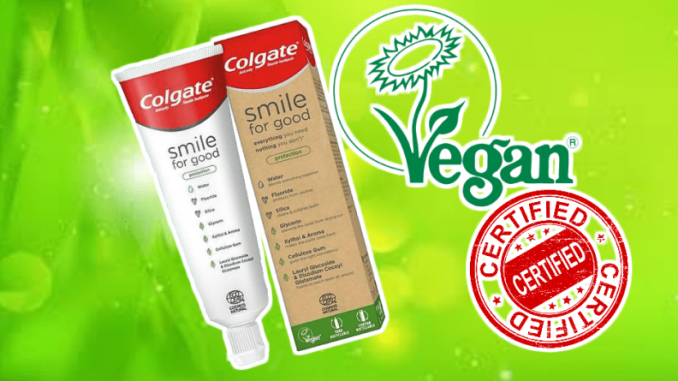
Colgate launched a new toothpaste for vegans in Europe. Great right? No, not really. This new toothpaste for vegans mystifyingly contains fluoride. Sure, there are lots of things about this toothpaste that make it green, eco-friendly and free of animal cruelty, which is great. However, they still were unable to keep it free from human cruelty. The gesture to make a vegan toothpaste that is better for the animals and the environment is progressive and commendable. However, the decision to make this product with fluoride is a reminder that there is still a long way to go toward moving society away from toxic corporate junk science.
Hicks, Cherrill. “The Truth about Fluoride.” The Independent, Independent Digital News and Media, 22 Oct. 2011, www.independent.co.uk/life-style/health-and-families/health-news/the-truth-about-fluoride-1351951.html.
The good thing about this toothpaste is that it is has a recyclable tube. According to The Guardian, this new toothpaste tube is made from high-density polyethylene (HDPE), which is the same plastic used for most milk containers. Some have an issue with this as well but it’s still much better and more eco-friendly than the regular plastic used for most tubes. What’s also good is that although most toothpaste is made with glycerin, which is a byproduct of animal fat, this toothpaste is not. The Smile For Good line uses plant-based glycerin. Colgate also claims that its product is 99.7 percent “natural”, and each ingredient that is listed has its purpose or function explained. One of those ingredients is fluoride with the reason listed to fight cavities. Most people would most likely accept this justification easily as fluoride was normally added to dental products for decades. For a vegan crowd, however, they might have to consider providing peer-reviewed research with those claims, which we know they’ll never do, nor can they. The corporate science myth that fluoride, which is actually a neurotoxin poison harmful to brain function, is good for fighting cavities, may not be very popular in many vegan circles.
Had Colgate done its research it’d know that although many vegans are vegan strictly for the animals, there are hordes of vegans who are knowledgeable holistic health buffs. That being said, they should know that many vegans are not fans of fluoride because its benefits are based on false outdated corporate science and that fluoride is more harmful than it is any good. Corporate entities knowingly put poisonous toxic ingredients in many products. The only reason why this particular product is eye-opening is that this is a product made to cater to a demographic that would most likely object. Perhaps this product was made to target a greater audience of people who merely think they are getting the very best in terms of effectiveness and ethics? Who knows.
The Vegan Trap

There has been an uptick in anti-vegan rhetoric from many platforms. The rhetoric is also coming from content creators feigning to have some sort of enlightened inside knowledge when they do not. However, the information is based on some partial truths. Some corporations are making “vegan” products and the implication is that the product is vegan and therefore healthier. The fact that no animals were used does make it healthier as well as more ethical in and of itself. However, in some products, the preservatives or high amounts of sodium or sugar are very problematic. Corporate entities sometimes exploit health communities by making products catering to them, but still use some of the same toxic ingredients. A product being vegan is good, but that doesn’t mean there isn’t anything else to be concerned with. We still need to watch out for toxic ingredients in all products catering to any demographic.
Corporate entities are masters of trickery and the objective is to sell products. For example, diet sodas and “sugar-free” products were sold to people who believed they were choosing something healthier when no, they weren’t. Sugar-free products tend to be less healthy and more carcinogenic. They merely made sure the product “technically”, had little to no “sugar” according to the exact chemical make up of sugar. So eliminating one thing meant adding several other things people know little about, and thus created several other threats.
In a nutshell, this new “vegan” toothpaste is an example of corporate entities making a product that addresses an issue or health concern but still leaves other very problematic things intact. So for those intrigued or excited about this or similar products, the “fluoride-free” version of this product, if even in development, would be a better option to look out for.

Leave a Reply